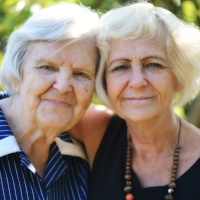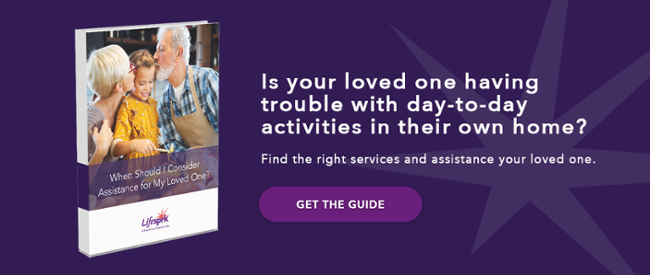
Being a family caregiver for a senior loved one is one of the most challenging and rewarding things you can do. However, being an effective caregiver draws on many different skills, some of which might come naturally to you like putting peoples’ needs before your own. Others may require some developments that will help you improve your relationship with your loved one.
Life beyond the COVID-19 pandemic has changed how many of us care for our older loved ones. As you shift roles and become the primary family caregiver, do you have everything you need to be confident and ready to be the best caregiver you can be?
Lifespark provides these additional caregiving guidelines/tips that you can use to help your loved one feel independent while living their best life.
Practice empathy
Dedicating time to a loved one as a caregiver is one of the most loving and selfless things you can do. An important part of caregiving is practicing empathy – seeing life from another person’s perspective instead of your own. Putting yourself in the shoes of your senior loved one will help you understand the challenges and difficulties they face and may even improve your relationship with them. Being empathetic to your loved one’s situation can help you improve the quality of your caregiving skills and increase your senior loved one’s quality of life.
Stay positive
Being a caregiver is a large responsibility and there are moments where it can be understandably overwhelming. Sometimes it can feel like there’s always a problem to solve or something to do.
Framing things positively and maintaining an optimistic outlook will help make day-to-day tasks seem more manageable. Positivity is contagious. When you are positive there’s a natural energy that occurs that not only affects your life but those around you, too.
When you feel positive about life and caregiving, you’ll be able to give more time and energy to your senior loved one. Both you and your loved one’s life will also benefit as a result of this positive attitude.
Be patient
Being patient is about making a conscious effort to slow down and think about what your senior loved one needs in the present moment. To be able to give your loved one all you can without feeling overwhelmed is no small task, but there are ways to help you manage your life and be the best caregiver you can be.
It can be tempting to rush through your caregiving routine. You probably have other work, family, or social commitments going on in your life and you’re trying to balance both. A little bit of patience can go a long way for a senior and keep you calm.
Try to enjoy these moments of slowing down. Focusing on patience and being present will help improve your caregiving skills and allow your loved one to feel more relaxed.
Pay attention to body language
Whenever you’re listening or talking to your loved one, make sure to observe their body language in addition to their words. Body language is often a subtle yet powerful way for caregivers to detect unspoken cues given by a senior. You may notice that they’re feeling tired, unwell or unhappy without them having to say anything.
When you’re a caregiver, it’s important that you pay extra attention to how your senior loved one might be trying to convey something to you. “Passive communication in the form of body language is just as important as direct verbal communication,” said Kari Schwartz, RN, Lifespark Life Manager. “Sometimes understanding subtle cues can be even more revealing. The best thing you can do is watch your loved one and learn what triggers certain behavior changes and how they physically react. You can learn a lot which will shape how you approach each situation to build engagement and trust.”
Improve your communication skills
Strong communication skills go hand-in-hand with being a good caregiver. Clear communication could be as straightforward as discussing your loved one’s daily routine or as intricate as talking about health conditions, doctor’s appointments, or even the complexities of late-life care. Knowing how and when to bring up some of these subjects is a challenge for most caregivers. When communicating with your loved one, it is important that you are approachable, patient, and calm in order to foster strong relationships and allow for an open and clear dialogue.
Good communication is even more important if there are multiple people involved in the care routine. Each caregiver will need to be proactive in communicating any changes in routine or concerns about health issues with the others to maintain consistency.
Listen to your loved one
Taking the time to truly listen to what your senior loved one is trying to communicate will help improve your relationship with them. Your loved one needs to feel that their thoughts, concerns, and feelings are validated when communicating with you. When you have a conversation together, make sure to give them your undivided attention and listen closely to what they have to say.
Try to never make important decisions without talking with your loved one first. If your loved one knows that you will attentively listen to them, they more likely will open up to you and share their thoughts and feelings so the two of you can come up with a clear plan that keeps their goals and wishes top priorities.
While being a caregiver can be challenging, it’s also very rewarding to know that you’ve helped your loved one achieve things in their daily life that they wouldn’t have been able to do without your support. As you learn ways to improve your caregiving skills, you’ll likely find that everyday tasks feel easier and a little less like work but deepening in your relationship.
How can Lifespark help you care for your loved one during COVID-19?
Many adult children have found themselves taking on the new role of family caregiver, some even unexpectedly, but they do it with good intentions. The key is finding the balance so that you can still maintain life as their daughter or son, and not their care provider; the two relationships can be very different. Lifespark can help guide you through the process so you know what to expect and what to anticipate so you are prepared. And for the parts of caregiving you find uncomfortable or unmanageable, we are here to help – whether in person or at a distance.
We’ve seen that aging magnificently is possible, even in a pandemic. Lifespark is ready to help guide you to help keep yourself and your older loved ones safe, healthy, and living life now through this pandemic and beyond.
Call us at 952-345-0919. Whether you need day-to-day in-home support, medical care at home, a driver companion to help with errands, or just some friendly guidance, we can help. Check out our free resources to keep your loved one happy and healthy at home.




